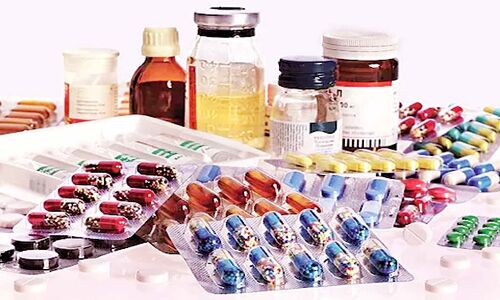Live
- Tribal leader Vaba Yogi nominated as DVMC member
- Ola Electric expands network
- NRI deposits soar $11.9 bn in 7 mths
- Positive outlook on FDI inflows in 2025
- EY forecasts 6.5% GDP growth for FY25
- Chicco opens new store
- DPIIT-recognised startups over 1.57 lakh
- Gunfight between armed groups in Imphal village
- Road blockade in Pak: 100 kids die awaiting aid
- Will develop constituency in every aspect: Bojju Patel
Just In

Foreign equity infusion into pharmaceutical industry registered a decline of 5.1% in FY22
With the country managed the third wave of the pandemic better with lesser number of severe cases, the foreign equity infusion has also seen a decline during the financial year 2021-22. Now, the government should do more to attract more FDI equity inflow into the pharmaceutical sector which is one of the top ten attractive sectors for foreign investment in India
After registering over 200 per cent growth in Foreign Direct Investment (FDI) equity inflow into the sector in the previous year, the foreign equity infusion into the drugs and pharmaceutical industry in India has registered a decline of 5.1 per cent during the just concluded financial year of 2021-22. The FDI inflow into the drugs and pharmaceuticals sector for the fiscal year ended March 31, 2022 was $1.41 billion as compared to $1.49 billion inflow reported during the previous fiscal year ended March 31, 2021. The period from April 2020 to March 2021 has reported an FDI flow of $1.49 billion into the drugs and pharmaceutical industry, as against a meager $518 million reported in the previous fiscal year of 2019-20, registering a growth of 202 per cent over the previous year. The Economic Survey, released by the Union Finance Ministry, for the year 2021-22 had recognised this growth, stating that the FDI in the pharmaceutical sector has seen a sudden spurt in 2020-21 vis-a-vis the previous year showing a 200 per cent increase. The extraordinary growth of foreign investments in the pharma sector was mainly on account of investments to meet Covid-19 related demands for therapeutics and vaccines. However, with the country managed the third wave of the pandemic better with lesser number of severe cases, the foreign equity infusion has also seen a decline during the financial year 2021-22.
In fact, in the first six months from April to September 2022, FDI inflows into the drugs and pharmaceutical sector in the country continued to be buoyant at Rs 4,413 crore, growing at the rate of 53 per cent over the same period in 2020-21. However, after that the FDI inflows into the country did not meet the targets as the FDI into drugs and pharmaceutical industry in the country has seen a decline of 3.2 per cent in the first nine months of the fiscal year 2021-22. According to data from the Union Ministry of Commerce and Industry, the FDI inflow into drugs and pharmaceuticals for the nine months ended December, 2021, stood at $1.21 billion, as compared to $1.25 billion in the same period of last year. During the October to December quarter of 2021-22, the inflow was $647.29 million as against $ 879 million in the corresponding three months of previous fiscal year, reporting a 26.4 percent decline.
FDI in pharmaceutical industry is one of the top ten attractive sectors for foreign investment in India, accounting for around 3.3 per cent of the total FDI inflow into the country. Foreign investments in pharmaceuticals in greenfield projects are allowed up to 100 per cent under the automatic route and for brownfield pharmaceutical projects, foreign investment beyond 74 percent, central government approval is mandatory. After abolition of Foreign Investment Promotion Board (FIPB) in May 2017, the Department of Pharmaceutical (DoP) has been assigned the role to consider the foreign investment proposals under the government approval route. Till December 2021, the DoP has approved 10 FDI proposals worth Rs 7,860 crore inflows under the brownfield pharmaceutical projects during the financial year 2021-22. An online portal, namely, 'FDI linked Compliance Monitoring Portal' has been developed by the DoP to monitor progress of FDI inflows received by the Indian companies in the pharmaceutical sector and ensure compliances of FDI linked performance conditions as required under the extant FDI Policy. The country meets 62 per cent of the global demand for various vaccines, 40 percent of the generic market in the US and 25 per cent of all medicine in the UK. India has around 20 per cent market share of generic medicines in terms of volume in the global pharmaceutical sector. India is the source of 60,000 generic brands across 60 therapeutic categories and manufactures more than 500 different Active Pharmaceutical Ingredients (APIs). The export of generic drugs is one of India's core strengths. The country's pharmaceutical exports stood at around $24 billion in fiscal year 2021-2022.
It is a fact that the Indian government had taken several initiatives to address the requirements of the pharmaceutical and medical devices industry in the country. Various initiatives such as 'Scheme for Promotion of Bulk Drug Parks' that envisages creation of world class infrastructure facilities in order to make Indian bulk drug industry a global leader was approved on March 20, 2020. Besides, production linked incentive (PLI) scheme for bulk drugs has also been approved for promotion of domestic manufacturing of 53 critical APIs in the country with a budget of Rs 6,940 crore for the next eight years. In addition, PLI scheme for pharmaceuticals was approved by the government on March 24, 2021, with a total financial outlay of Rs 15,000 crore. Now, the government should do more to attract more FDI equity inflow into the pharmaceutical sector which is one of the top ten attractive sectors for foreign investment in India.
(The author is freelance journalist with varied experience in different fields)

© 2024 Hyderabad Media House Limited/The Hans India. All rights reserved. Powered by hocalwire.com







